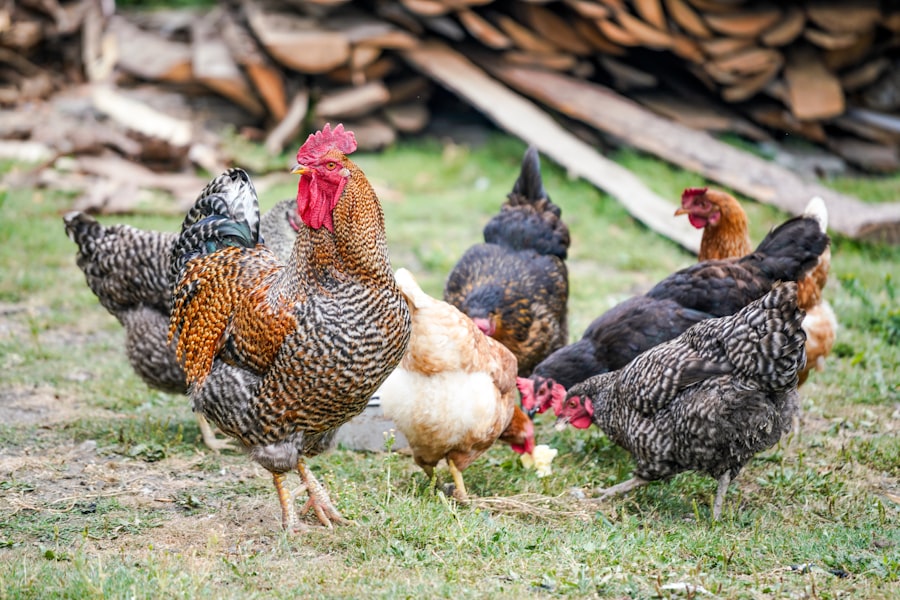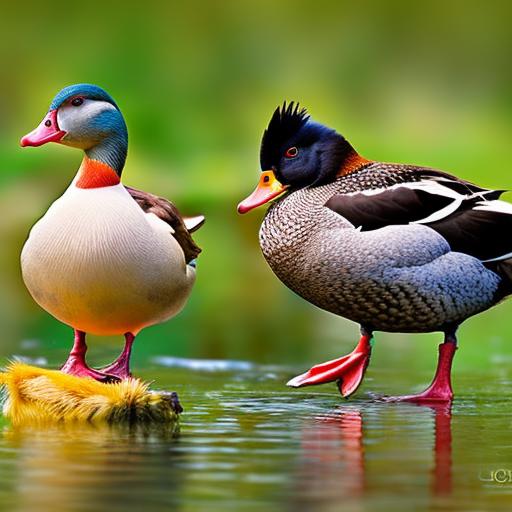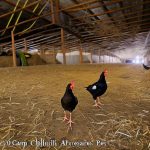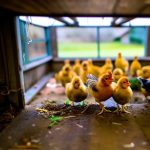Keeping ducks and chickens together in a mixed flock can be a rewarding and enjoyable experience for poultry enthusiasts. Not only does it provide a diverse and interesting environment, but it also offers several benefits for both the birds and their caretakers. As someone who has raised ducks and chickens together for many years, I can attest to the positive aspects of this arrangement. In this article, we will explore the benefits of raising ducks and chickens together, understand the differences between these two species, discuss the considerations for choosing the right breeds, delve into housing requirements, feeding and watering options, health concerns, managing social dynamics, and maintaining a clean environment.
Key Takeaways
- Keeping ducks and chickens together is possible and can have benefits.
- Raising ducks and chickens together can provide a variety of eggs and meat.
- Ducks and chickens have different needs and behaviors that should be understood.
- Choosing compatible breeds is important for successful cohabitation.
- Adequate housing, feeding, and preventative health measures are necessary for a healthy mixed flock.
Benefits of raising ducks and chickens together
One of the main benefits of keeping ducks and chickens together is increased egg production. Ducks are known for their prolific egg-laying abilities, and by having them in the same flock as chickens, you can enjoy a variety of eggs. Ducks typically lay larger eggs with a richer yolk, while chickens produce smaller eggs with a milder flavor. This variety can be appealing to those who enjoy experimenting with different culinary creations.
Another advantage of having mixed flocks is pest control. Ducks are natural foragers and are excellent at hunting insects, slugs, and snails. They can help keep your garden free from pests and reduce the need for chemical pesticides. Chickens also contribute to pest control by scratching the ground and eating bugs. Together, ducks and chickens create a dynamic pest control team that can benefit your garden or backyard.
Companionship is another benefit of raising ducks and chickens together. These birds have different personalities and behaviors, which can make for an interesting and entertaining flock. Ducks are known for their playful nature, while chickens are more social creatures. By having both species in your flock, you can observe their interactions and enjoy their unique behaviors.
Reduced feed costs are yet another advantage of keeping ducks and chickens together. Ducks have a higher foraging ability compared to chickens, which means they require less supplemental feed. By allowing them to free-range and graze on grass and insects, you can save on feed costs. Chickens can also benefit from the foraging behavior of ducks and may consume less feed as a result.
Understanding the differences between ducks and chickens
Before deciding to keep ducks and chickens together, it is important to understand the differences between these two species. Ducks and chickens have distinct physical and behavioral characteristics that can impact their interactions within a mixed flock.
Physically, ducks are larger than chickens and have webbed feet, which make them excellent swimmers. They also have a layer of waterproof feathers that allow them to stay dry in water. Chickens, on the other hand, have scaly feet and are not adapted for swimming. Their feathers are not waterproof, so they prefer to stay dry.
Behaviorally, ducks are more independent and tend to roam farther from the coop or run. They are also more prone to flying, especially certain breeds like Muscovy ducks. Chickens, on the other hand, are more social and tend to stay closer to the coop or run. They are not strong flyers and prefer to stay on the ground.
When it comes to interactions between ducks and chickens, it is important to note that they can coexist peacefully if introduced properly. Ducks may be curious about chickens and may try to interact with them by nibbling or pecking at their feathers. Chickens may initially be wary of ducks but will usually become accustomed to their presence over time. It is important to monitor their interactions initially and intervene if any aggressive behavior occurs.
Choosing the right breed of ducks and chickens for cohabitation
When selecting breeds for a mixed flock of ducks and chickens, it is important to consider compatibility factors. Some breeds of ducks and chickens may be more compatible than others due to their size, temperament, and foraging abilities. It is also important to choose breeds that have similar space and housing requirements.
For ducks, breeds like Pekin, Khaki Campbell, and Indian Runner are popular choices for mixed flocks. These breeds are known for their docile temperament and good foraging abilities. They also tend to be smaller in size compared to other duck breeds, which can make them more compatible with chickens.
For chickens, breeds like Rhode Island Red, Sussex, and Orpington are good choices for mixed flocks. These breeds are known for their calm temperament and ability to get along with other birds. They also tend to be larger in size, which can help establish a pecking order within the flock.
It is important to research specific breed characteristics and consult with experienced poultry keepers before making a decision. Each breed has its own unique traits and requirements, so it is important to choose breeds that will thrive in your specific environment.
Housing requirements for ducks and chickens
When it comes to housing ducks and chickens together, there are several design considerations to keep in mind. The coop and run should provide adequate space for both species, as well as separate areas for nesting and roosting.
The coop should be spacious enough to accommodate both ducks and chickens comfortably. Ducks require more floor space compared to chickens due to their larger size and need for swimming water. The coop should have a solid floor or a deep litter system to accommodate the water needs of ducks. It should also have proper ventilation to prevent moisture buildup.
The run should be securely fenced to prevent predators from entering and should provide ample space for both ducks and chickens to roam. Ducks require access to water for swimming, so the run should have a shallow pool or pond for them to enjoy. Chickens can benefit from having dust bathing areas in the run.
Nesting boxes should be provided for both ducks and chickens. Ducks prefer to nest on the ground, so a shallow box filled with straw or shavings can be provided. Chickens prefer elevated nesting boxes, so these should be placed higher up in the coop. Roosting areas should also be provided for chickens, as they prefer to perch at night.
Feeding and watering ducks and chickens together

Feeding and watering ducks and chickens together requires careful consideration of their nutritional needs and feeding options. While both species can consume similar types of feed, ducks have higher protein requirements compared to chickens.
Ducks require a higher protein content in their diet to support their growth and egg production. A feed with at least 16-18% protein is recommended for ducks. Chickens can also consume this feed, but it is important to monitor their protein intake, as excessive protein can lead to health issues.
Feeding options for ducks and chickens include commercial poultry feed, kitchen scraps, and foraging. Commercial poultry feed provides a balanced diet for both species and ensures they receive all the necessary nutrients. Kitchen scraps can be offered in moderation, but it is important to avoid feeding them foods that are toxic to poultry, such as onions, garlic, and chocolate.
Watering options for ducks and chickens should accommodate their different needs. Ducks require access to water for swimming and cleaning their feathers. A shallow pool or pond should be provided in the run or nearby. Chickens require access to clean drinking water at all times. Waterers should be placed at a height that is accessible to both species.
Health concerns and preventative measures for mixed flocks
When keeping ducks and chickens together, it is important to be aware of common health issues that can affect both species. Some diseases can be transmitted between ducks and chickens, so preventative measures should be taken to minimize the risk of infection.
Common health issues in mixed flocks include respiratory infections, parasites, and nutritional deficiencies. Ducks are more susceptible to respiratory infections, so it is important to provide proper ventilation in the coop and monitor their respiratory health. Parasites like mites and lice can affect both ducks and chickens, so regular inspections and treatments should be conducted. Nutritional deficiencies can occur if the birds are not receiving a balanced diet, so it is important to provide appropriate feed and supplements if necessary.
Vaccinations are available for certain diseases that can affect ducks and chickens. Consult with a veterinarian or experienced poultry keeper to determine which vaccinations are recommended for your specific area. It is also important to practice good biosecurity measures, such as quarantining new birds before introducing them to the flock, regularly cleaning and disinfecting the coop, and preventing contact with wild birds.
Managing social dynamics between ducks and chickens
Social dynamics within a mixed flock of ducks and chickens can be complex, as each species has its own hierarchy and pecking order. It is important to understand these dynamics and manage them appropriately to prevent aggression and stress.
Ducks have a more relaxed social structure compared to chickens. They do not establish a strict pecking order like chickens do. However, they may still exhibit dominance behaviors, such as nibbling or pecking at each other. It is important to monitor their interactions and intervene if any aggressive behavior occurs.
When introducing new birds to the flock, it is important to do so gradually and in a controlled manner. This allows the birds to establish a new pecking order without causing excessive stress or aggression. Introducing new birds during the evening or at night can help reduce aggression, as the birds will be less active and focused on roosting.
If aggressive behavior does occur within the flock, it may be necessary to separate the aggressive bird temporarily. This allows the other birds to establish a more peaceful dynamic without fear of being attacked. The separated bird can be reintroduced once the aggression has subsided.
Cleaning and maintaining a mixed flock environment
Regular cleaning and maintenance of the coop and run are essential for the health and well-being of a mixed flock. This helps prevent the buildup of waste, parasites, and pathogens that can negatively impact the birds.
The coop should be cleaned regularly to remove droppings, feathers, and bedding material. A deep litter system can be used to help manage waste and provide insulation. The litter should be turned regularly to promote decomposition and prevent odors.
The run should also be cleaned regularly to remove droppings and debris. This helps prevent the buildup of pathogens and parasites. The run should be raked or tilled periodically to break up the soil and expose any parasites or larvae to sunlight.
Pest control measures should be implemented to prevent infestations. This can include using natural deterrents like diatomaceous earth or introducing beneficial insects like ladybugs or nematodes. Regular inspections for signs of pests, such as mites or lice, should also be conducted.
Maintaining a healthy environment for the birds includes providing clean water and feed at all times. Waterers should be cleaned regularly to prevent algae growth and bacterial contamination. Feeders should be kept clean and free from mold or pests.
Is keeping ducks and chickens together right for you?
Keeping ducks and chickens together in a mixed flock can be a rewarding experience for poultry enthusiasts. The benefits of increased egg production, pest control, companionship, and reduced feed costs make it an attractive option for many. However, it is important to consider the differences between ducks and chickens, choose compatible breeds, provide appropriate housing, feeding, and watering options, address health concerns, manage social dynamics, and maintain a clean environment.
I have personally found keeping ducks and chickens together to be a positive experience. The variety of eggs, the entertainment provided by their interactions, and the benefits to my garden have made it a worthwhile endeavor. However, it is important to do further research and make an informed decision based on your specific circumstances and preferences. Consult with experienced poultry keepers, read books and articles, and join online forums or local poultry groups to gather more information and insights. With proper planning and care, keeping ducks and chickens together can be a fulfilling and enjoyable endeavor.
If you’re considering keeping ducks and chickens together, it’s important to understand the dynamics and requirements of both species. To help you make an informed decision, Poultry Wizard has a comprehensive article on their website that explores the topic in detail. This article provides valuable insights into the benefits and challenges of cohabitating ducks and chickens, as well as tips on how to create a suitable environment for them. To learn more, check out their article on can you keep ducks and chickens together. Additionally, if you’re looking for practical solutions such as renting a chicken coop or insulating your existing one, Poultry Wizard offers helpful articles on renting a chicken coop and how to insulate a chicken coop.
FAQs
Can ducks and chickens live together?
Yes, ducks and chickens can live together in the same coop and run as long as they have enough space and resources.
What are the benefits of keeping ducks and chickens together?
Keeping ducks and chickens together can provide a variety of benefits, including pest control, increased egg production, and companionship for both species.
What are the challenges of keeping ducks and chickens together?
One of the main challenges of keeping ducks and chickens together is that ducks require more water than chickens, which can make the coop and run wet and muddy. Additionally, ducks may be more prone to disease than chickens, so it’s important to keep the coop and run clean and well-maintained.
What should I feed my ducks and chickens?
Ducks and chickens have different dietary needs, so it’s important to provide them with separate feeders and waterers. Chickens require a diet high in protein, while ducks require a diet high in niacin. It’s important to choose a feed that is appropriate for each species.
How much space do ducks and chickens need?
Ducks and chickens require different amounts of space, but as a general rule, each bird should have at least 4 square feet of indoor space and 10 square feet of outdoor space. However, more space is always better, especially if you plan to keep a large flock.
What should I consider before keeping ducks and chickens together?
Before keeping ducks and chickens together, it’s important to consider the space and resources you have available, as well as the temperament of each species. Ducks can be more aggressive than chickens, so it’s important to monitor their behavior and provide enough space to prevent conflicts. Additionally, ducks require more water than chickens, so you’ll need to provide a water source that is appropriate for both species.
Meet Walter, the feathered-friend fanatic of Florida! Nestled in the sunshine state, Walter struts through life with his feathered companions, clucking his way to happiness. With a coop that’s fancier than a five-star hotel, he’s the Don Juan of the chicken world. When he’s not teaching his hens to do the cha-cha, you’ll find him in a heated debate with his prized rooster, Sir Clucks-a-Lot. Walter’s poultry passion is no yolk; he’s the sunny-side-up guy you never knew you needed in your flock of friends!







